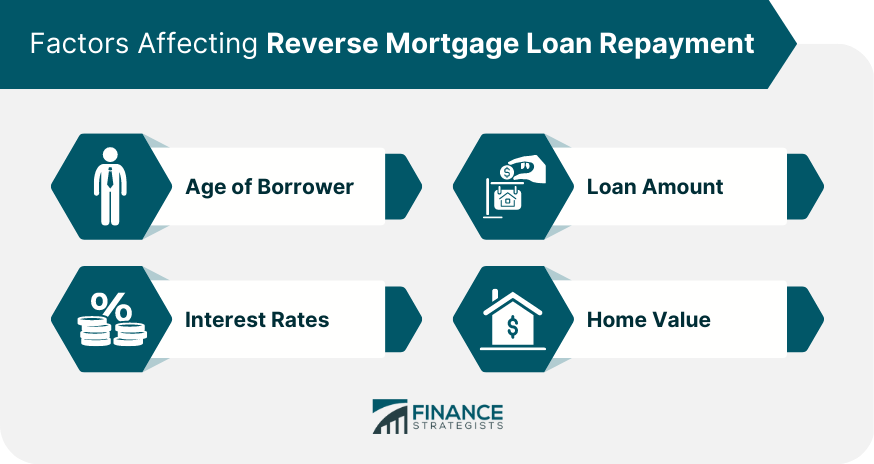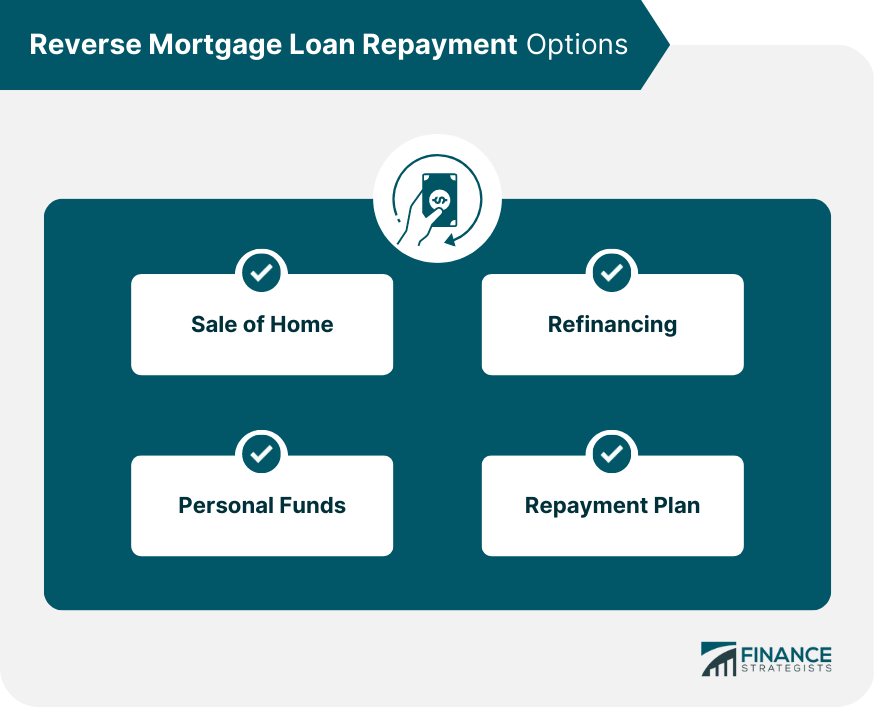Reverse mortgage loan repayment refers to the process of paying back the loan balance, including the principal amount borrowed, interest, and any fees or charges associated with the loan. Unlike traditional mortgages, reverse mortgage borrowers do not need to make monthly payments. Instead, the loan balance increases over time as interest accrues. Repayment becomes due when the borrower passes away, sells the home, or permanently moves out. Repayment options for reverse mortgage loans include selling the home, refinancing, using personal funds, or entering into a repayment plan. The age of the borrower plays a significant role in the repayment process, as the loan becomes due upon the borrower's death or permanent relocation. Higher interest rates lead to a faster-growing loan balance, potentially making repayment more difficult. The total loan amount, including principal, interest, and fees, will affect the overall repayment obligation. The value of the home will impact the amount of equity available for repayment and may affect the borrower's ability to refinance or sell the home to repay the loan. Selling a home is a common method for repaying a reverse mortgage loan. The proceeds from the sale are used to pay off the loan balance, and any remaining equity is distributed to the borrower or their heirs. Refinancing the reverse mortgage with a traditional mortgage or another financial product can be an option for repayment, particularly if the home's value has increased significantly. Borrowers can choose to repay their reverse mortgage loan using personal funds, such as savings or investments. In some cases, borrowers may work with their loan servicer to establish a repayment plan that allows them to pay off the loan balance over time gradually. Failure to repay a reverse mortgage loan can result in the loss of home ownership, as the lender may foreclose on the property to recoup their investment. Legal action may be taken against the borrower or their estate if the loan remains unpaid. Non-repayment of a reverse mortgage loan can negatively impact the borrower's credit score, making it more difficult to secure future loans or credit. To be eligible for reverse mortgage loan repayment options, borrowers must meet specific age, property, and financial requirements. Different repayment options may have their own unique qualifications. For example, refinancing may require the borrower to have a certain credit score, while a repayment plan might necessitate a steady income source. Loan servicers are responsible for providing borrowers with the necessary information and support to understand and navigate their repayment options. This includes timely communication and assistance in evaluating available options. It's crucial for borrowers to regularly review their reverse mortgage loan statements to stay informed about their loan balance, interest rates, and any fees or charges. Maintaining current property taxes and homeowners insurance is essential for avoiding potential issues with the reverse mortgage loan. Failure to do so could trigger a loan default and result in foreclosure. Ensuring the home is well-maintained and in good condition is necessary for preserving its value and maintaining eligibility for the reverse mortgage loan. Maintaining open communication with the loan servicer is important to promptly address any issues or concerns regarding the reverse mortgage loan. Seeking the advice of trusted financial advisors, attorneys, or housing counselors can provide borrowers with guidance on managing their reverse mortgage loan and making informed decisions regarding repayment. Home equity loans are a type of loan in which the borrower uses their home's equity as collateral. These loans require monthly payments and typically have lower interest rates than reverse mortgages. A Home Equity Line of Credit (HELOC) is a revolving line of credit secured by the borrower's home equity. Borrowers can draw on the line of credit as needed and make monthly payments based on the amount borrowed. Some states and local governments offer property tax deferral programs for senior citizens, allowing them to postpone paying property taxes on their homes. These programs can help reduce the financial burden on seniors and may serve as an alternative to reverse mortgage loans. Reverse mortgage loan repayment refers to the process of paying back the loan balance, including the principal amount borrowed, interest, and any fees or charges associated with the loan. Unlike traditional mortgages, reverse mortgage borrowers do not need to make monthly payments, and repayment becomes due when the borrower passes away, sells the home, or permanently moves out. Factors affecting reverse mortgage loan repayment include the borrower's age, interest rates, loan amount, and home value. Repayment options for reverse mortgage loans include selling the home, refinancing, using personal funds, or entering into a repayment plan. Borrowers must meet specific age, property, and financial requirements to be eligible for reverse mortgage loan repayment options, and different repayment options may have their own unique qualifications. Non-repayment of a reverse mortgage loan can result in the loss of home ownership, legal action against the borrower or their estate, and negatively impact the borrower's credit score. To manage a reverse mortgage loan effectively, borrowers should regularly review loan statements, keep property taxes and insurance current, maintain the home, communicate with the loan servicer, and consult with trusted advisors. Finally, alternatives to reverse mortgage loans include home equity loans, home equity lines of credit (HELOCs), and property tax deferral programs. It is essential to evaluate all available options carefully and seek professional advice before making any decisions regarding reverse mortgage loan repayment or alternatives.Overview of Reverse Mortgage Loan Repayment
Factors Affecting Reverse Mortgage Loan Repayment
Age of Borrower
Interest Rates
Loan Amount
Home Value

Reverse Mortgage Loan Repayment Options
Sale of Home
Refinancing
Personal Funds
Repayment Plan

Consequences of Non-Repayment of Reverse Mortgage Loan
Loss of Home Ownership
Legal Action
Credit Score Impact
Eligibility for Reverse Mortgage Loan Repayment
Requirements for Eligibility
Qualifications for Different Repayment Options
Loan Servicer Obligations
Tips for Managing a Reverse Mortgage Loan
Regularly Review Loan Statements
Keep Property Taxes and Insurance Current
Maintain the Home
Communicate With Loan Servicer
Consult With Trusted Advisors
Alternatives to Reverse Mortgage Loans
Home Equity Loans
Home Equity Lines of Credit (HELOCs)
Property Tax Deferral Programs
Conclusion
Reverse Mortgage Loan Repayment FAQs
Reverse mortgage loan repayment refers to the process of paying back the amount borrowed, interest, and fees for a reverse mortgage. This typically occurs when the borrower moves out of the home, sells the property, or passes away.
The factors affecting reverse mortgage loan repayments include the borrower’s age, interest rates, the total loan amount, and the home’s value.
Some methods for repaying a reverse mortgage loan include sale of the home, refinancing, personal funds, and repayment plans.
To be eligible for reverse mortgage loan repayment options, borrowers must meet specific age, property, and financial requirements. Different repayment options may have their own unique qualifications. Loan servicers are responsible for providing borrowers with the necessary information and support to understand and navigate their repayment options. You may inquire with a specific loan provider to determine their eligibility criteria.
Yes, there are alternatives to repayment for a reverse mortgage loan. One option is to refinance the loan with a conventional mortgage, while another is to sell the home and use the proceeds to repay the loan. However, both of these options require the borrower to have sufficient income and creditworthiness.
True Tamplin is a published author, public speaker, CEO of UpDigital, and founder of Finance Strategists.
True is a Certified Educator in Personal Finance (CEPF®), author of The Handy Financial Ratios Guide, a member of the Society for Advancing Business Editing and Writing, contributes to his financial education site, Finance Strategists, and has spoken to various financial communities such as the CFA Institute, as well as university students like his Alma mater, Biola University, where he received a bachelor of science in business and data analytics.
To learn more about True, visit his personal website or view his author profiles on Amazon, Nasdaq and Forbes.















